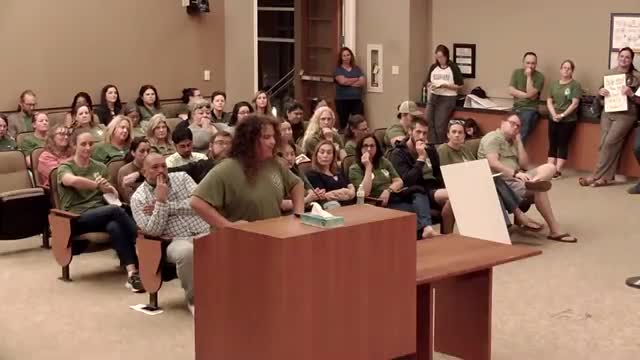Teachers and families press Washington Unified board over pay and staffing as negotiations continue
October 10, 2025 | West Sacramento, Yolo County, California
This article was created by AI summarizing key points discussed. AI makes mistakes, so for full details and context, please refer to the video of the full meeting. Please report any errors so we can fix them. Report an error »

Dozens of teachers, students and parents pressed the Washington Unified School District Board of Education on Oct. 9 over teacher pay, staffing and benefits during the meeting’s public-comment period.
Several speakers tied classroom stability and student outcomes directly to teacher pay and benefits. “How can we afford $100,000,000 for streets that don’t get fixed and infrastructure that never gets worked on, but we can’t afford a raise for our teachers?” said Chase Veil, who identified himself as a student, calling teacher departures “disgusting” and urging higher wages. River City High School junior Connor Lewis thanked teachers for their impact and asked the board to “do everything in our power to keep them here in West Sacramento.”
Teachers described mounting financial strain and the human cost of turnover. “He left us because he couldn’t afford to be a teacher anymore,” said Deanna Trujillo Chrisman, an SDC teacher at Bridgeway Island School, describing the resignation of a colleague she named as Sal Mejia. “He realized his salary and his benefits weren’t going to work to provide for that family.”
Reading intervention specialist Sarah Fowler said she commutes from Elk Grove and fears leaving because she cannot support her family if pay does not improve. “As much as I love this work … I cannot keep doing it if I cannot support my own family,” Fowler said.
Union speakers and parents questioned recent district budget decisions. WSTA President Knapp said the union attended a recent “mini budget” session with district leaders and characterized the district’s creation of a $16,000,000 stability fund as a choice to treat recurring ending balances as “one-time” money. “If we budget so there’s money overflowing every year, it is not one-time funds,” Knapp said, arguing that retaining teachers should be a higher priority than some outside contractor spending the union described.
Parents at the meeting echoed teachers’ concerns. “Quality teaching is what drives student success,” said parent BJ Thompson, adding that local taxpayers expect investments to support teachers. Several student speakers also urged the board to prioritize pay so that their favorite teachers do not leave.
Board members and district leaders did not take action on contract terms at the meeting. Superintendent Dr. Hildreth and other administrators acknowledged teachers’ stories during the meeting’s closing remarks and reiterated that negotiations and collaborative sessions with unions are ongoing. Board members said they heard the public comment and pledged to keep working with labor partners and staff to identify priorities and next steps.
The public-comment period included about 13 speakers on this item; the board had previously adjusted its public-comment timing rules and explained a tiered time allotment for large speaker counts. The district and unions are in active contract negotiations; speakers at the meeting referenced bargaining-level discussions but no formal contract was adopted during the session.
Several speakers tied classroom stability and student outcomes directly to teacher pay and benefits. “How can we afford $100,000,000 for streets that don’t get fixed and infrastructure that never gets worked on, but we can’t afford a raise for our teachers?” said Chase Veil, who identified himself as a student, calling teacher departures “disgusting” and urging higher wages. River City High School junior Connor Lewis thanked teachers for their impact and asked the board to “do everything in our power to keep them here in West Sacramento.”
Teachers described mounting financial strain and the human cost of turnover. “He left us because he couldn’t afford to be a teacher anymore,” said Deanna Trujillo Chrisman, an SDC teacher at Bridgeway Island School, describing the resignation of a colleague she named as Sal Mejia. “He realized his salary and his benefits weren’t going to work to provide for that family.”
Reading intervention specialist Sarah Fowler said she commutes from Elk Grove and fears leaving because she cannot support her family if pay does not improve. “As much as I love this work … I cannot keep doing it if I cannot support my own family,” Fowler said.
Union speakers and parents questioned recent district budget decisions. WSTA President Knapp said the union attended a recent “mini budget” session with district leaders and characterized the district’s creation of a $16,000,000 stability fund as a choice to treat recurring ending balances as “one-time” money. “If we budget so there’s money overflowing every year, it is not one-time funds,” Knapp said, arguing that retaining teachers should be a higher priority than some outside contractor spending the union described.
Parents at the meeting echoed teachers’ concerns. “Quality teaching is what drives student success,” said parent BJ Thompson, adding that local taxpayers expect investments to support teachers. Several student speakers also urged the board to prioritize pay so that their favorite teachers do not leave.
Board members and district leaders did not take action on contract terms at the meeting. Superintendent Dr. Hildreth and other administrators acknowledged teachers’ stories during the meeting’s closing remarks and reiterated that negotiations and collaborative sessions with unions are ongoing. Board members said they heard the public comment and pledged to keep working with labor partners and staff to identify priorities and next steps.
The public-comment period included about 13 speakers on this item; the board had previously adjusted its public-comment timing rules and explained a tiered time allotment for large speaker counts. The district and unions are in active contract negotiations; speakers at the meeting referenced bargaining-level discussions but no formal contract was adopted during the session.
View full meeting
This article is based on a recent meeting—watch the full video and explore the complete transcript for deeper insights into the discussion.
View full meeting
